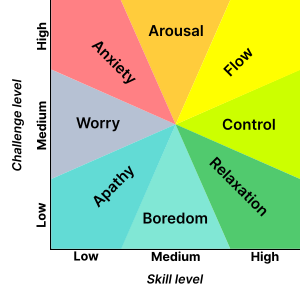
Back استرخاء Arabic רוגע HE Relaxáció Hungarian Rilassamento Italian リラクゼーション (心理学) Japanese ವಿಶ್ರಾಂತಿ Kannada 휴식 (심리학) Korean Relaks Polish Relaxare Romanian Relaxation SIMPLE

In psychology, relaxation is the emotional state of low tension, in which there is an absence of arousal, particularly from negative sources such as anger, anxiety, or fear.[2]
Relaxation is a form of mild ecstasy coming from the frontal lobe of the brain in which the backward cortex sends signals to the frontal cortex via a mild sedative.[citation needed] Relaxation can be achieved through meditation, autogenics, breathing exercises, progressive muscle relaxation and other means.
Relaxation helps improve coping with stress. Stress is the leading cause of mental and physical problems,[citation needed] therefore feeling relaxed is often beneficial for a person's health. When a person is highly stressed, the sympathetic nervous system is activated because one is in a fight-or-flight response mode; over time, this could have negative effects on a human body.
- ^ Csikszentmihalyi M (1997). Finding Flow: The Psychology of Engagement with Everyday Life (1st ed.). New York: Basic Books. p. 31. ISBN 978-0-465-02411-7.
- ^ Oxford Dictionaries (2014). Relaxation Archived 2014-11-09 at the Wayback Machine